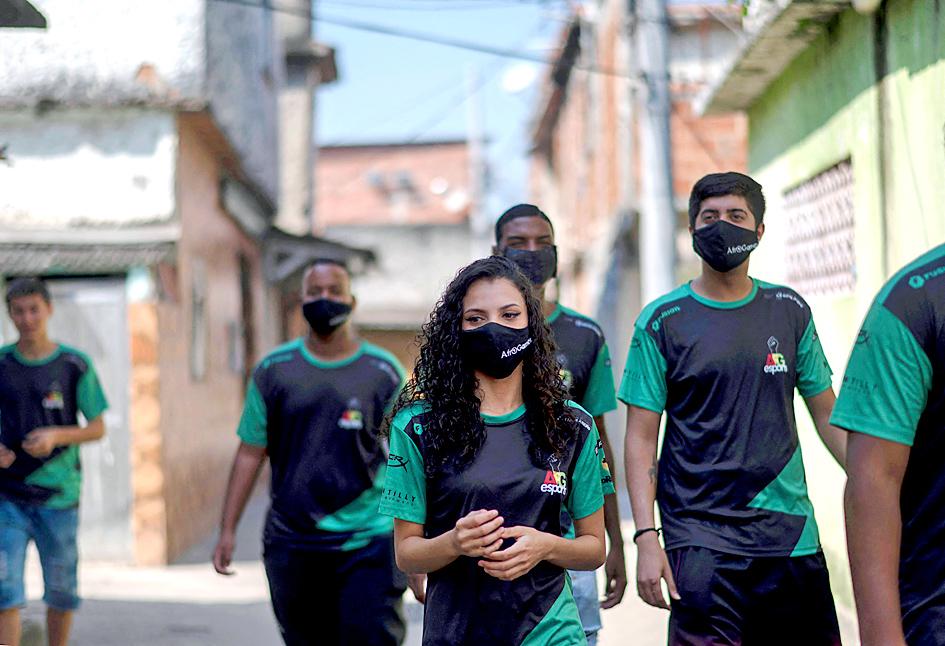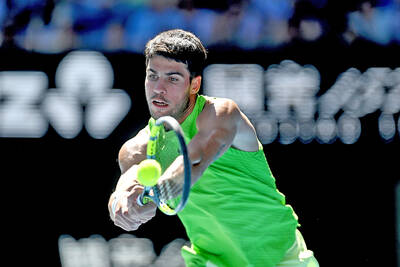Coming of age in the Brazilian favela of Vigario Geral, Luiz Augusto Jr used to spend his money playing video games, but now he makes a living as a gamer.
Augusto, 23, was working in construction as a stonemason’s apprentice three years ago when his life took a turn.
An avid gamer, he got involved with AfroGames, a charitable project to give young people in Rio de Janeiro’s impoverished favelas access to the multibillion-dollar gaming industry.

Photo: AFP
The project gave him training and a grant to launch his own channel online, where he posts gaming content under the moniker of “AFG Sr Madruga” and plays a mean game of Grand Theft Auto live for his fans.
“I used to spend a good part of my salary playing at a LAN house [a gaming center or cyber cafe] here in the favela,” he said.
“When I went to AfroGames, my mom and grandmother thought I could never make money playing video games. But they supported me, and here I am,” he said.
Augusto is the first livestreaming gamer sponsored by the project, which was launched by AfroReggae, a nonprofit organization that runs art and education programs.
About 100 young gamers participate in AfroGames, whose activities are sponsored by companies such as Brazilian airline GOL and media powerhouse Grupo Globo.
The project offers programming and English classes, and has set up a gaming center in Vigario Geral, with advanced computers and mentors to help the gamers learn.
It has also launched a professional gaming team called “AFG e-Sports,” whose six members earn minimum wage — 1,100 reals (US$207) per month — and prepare for tournaments with the help of a coach, a psychologist and a fitness trainer.
They made their debut at the League of Legends world tournament in 2019. The popular battle game’s championships handed out US$2.2 million in prizes that year.
Meanwhile, Augusto receives a monthly grant of 600 reals for his Webcasts.
“It’s brought me recognition in the favela and I want to go even farther. I want to be an influencer and a content producer. I’m learning to do that here,” he said.
The global gaming industry is not an easy world to access from the favelas of Brazil, where computers and gaming consoles are far too expensive for poor families.
The idea for AfroGames came from Ricardo Chantilly, a former music executive who is friends with AfroReggae’s directors.
“They wanted to do a music project, but I told them e-sports was the way to go. We set up a meeting for me to show them my idea,” he said.
In his presentation, he included pictures from international and Brazilian gaming tournaments, with packed gymnasiums where not a single black or brown face could be seen.
“We realized we weren’t represented in those pictures, so we said: ‘Why don’t we put a team together from the favela?’” AfroReggae codirector William Reis said.
The project is planning to expand to another Rio de Janeiro favela, Cantagalo, with an e-sports arena to hold what Reis is billing as the “first favela gaming championships.”
“When I was a kid, friends would get together and form a rock band,” Chantilly said. “Today, they put together an e-sports team. Gaming is the new rock ’n’ roll.”
AFG e-Sports team members train five days a week, in addition to English classes.
In another trailblazing move for the gaming world, which has faced accusations of sexist abuse of female players, the team includes one young woman: 19-year-old Gabriela Ferreira, known by her gamer name: “AFG Haru.”
“When we’re playing, being a woman makes no difference,” she said. “But if someone cracks some kind of joke, I just play harder so that I can beat them. Then I say: ‘See? You just lost to a girl.’”

The Philadelphia 76ers, fueled by 36 points from Tyrese Maxey and a triple-double from Joel Embiid, on Thursday beat the Houston Rockets 128-122 in an NBA overtime thriller. Cameroonian big man Embiid scored 32 points, grabbed 15 rebounds and handed out 10 assists, posting the ninth triple-double of his career to help the Sixers end the Rockets’ three-game winning streak. Rockets star Kevin Durant scored 36 points and Amen Thompson added 17, but Thompson was scoreless in the fourth quarter. Even so, the Rockets led by nine midway through the final frame, Maxey tying it at 115-115 with 40.1 seconds left. Durant missed a

The Milwaukee Bucks’ Giannis Antetokounmpo on Friday said that he will probably be out for an extended period after hurting his right calf again after a similar injury caused him to miss eight games earlier this season. Antetokounmpo had his right calf wrapped in the first half of their 102-100 loss to the Denver Nuggets. He did not appear comfortable the rest of the night and left for good with 34 seconds remaining. “At the end, I could not move no more, so I had to stop playing,” Antetokounmpo said. The two-time NBA Most Valuable Player said he expected to undergo an MRI

Taiwanese FORTUNES: Wu Fang-hsien and Hsieh Su-wei both advanced to the last 16 of the women’s doubles, but Ray Ho was ousted in the men’s doubles Carlos Alcaraz yesterday stepped up his quest to win a maiden Australian Open as he overwhelmed showman Corentin Moutet to reach the last 16, while Taiwan’s Wu Fang-hsien and Hsieh Su-wei both advanced to the last 16 of the women’s doubles. Three-time finalist Daniil Medvedev battled through on day six at a warm and sunny Melbourne Park, as did Coco Gauff. Top seed Alcaraz was never in danger against French 32nd seed Moutet, easing through 6-2, 6-4, 6-1 at Rod Laver Arena in 2 hours, 5 minutes. It was the Spaniard’s 100th Grand Slam match and he boasts a remarkable 87-13 win-loss record,

LICENSE TO THRILL: Fans of Learner Tien, the youngest man to reach the quarter-finals in 11 years, wore ‘L Plates,’ signs for learning drivers, in support of the 20-year-old Taiwan’s Wu Fang-hsien and Japanese partner Eri Hozumi yesterday dominated eighth seeds Ellen Perez of Australia and the Netherlands’ Demi Schuurs to advance to the Australian Open quarter-finals, the furthest the Taiwanese has made it since her first appearance in Melbourne in 2020. Wu and Hozumi overpowered world No. 21 Perez and world No. 20 Schuurs 6-2, 6-2 in 1 hour, 11 minutes at 1573 Arena in much cooled temperatures since Saturday’s blazing 40°C disrupted play. World No. 34 Wu has now made it further in the Australian Open since she was knocked out in the third round in 2024. The Taiwanese-Japanese duo